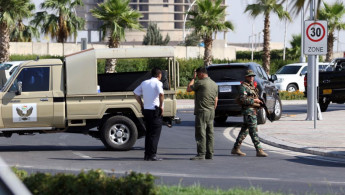Iraq authorities topple IS networks that 'planned bombings' in Erbil
Two Islamic State group-linked networks that planned bombings in Iraq have been uncovered, security officials in the Iraqi-Kurdistan region have said.
The Kurdistan Region Security Council (KRSC) said in a statement that authorities had thwarted a series of plans by IS to carry out bombings and terrorist operations before the new year 2023 in Erbil.
Four people who were allegedly "being directed by Daesh [IS] leaders" and were members of the networks were arrested, the KRSC said in its statement.
The KRSC said Hamza Iyad Ahmed and Muhajir Ahmed Al-Azzawi were arrested for suspected links to one of the networks.
Ahmed was allegedly "planning to blow himself up with an explosive belt" in front of a counter-terrorism service building with Al-Azzawi's help.
The two were also allegedly planning to "detonate a car bomb by remote control in front of a security centre building in the Ain Kawa area", the KRSC said.
The other network was composed of two men, including Musa Ismail Alwan Ismail, according to the KRSC.
The suspects lived in Syria's notorious Al-Hol camp, which holds displaced people and relatives of IS fighters. The suspects allegedly "participated in the killing" of residents there.
They came to Erbil last year and were "planning to carry out terrorist operations and assassinations in the city under the direction of Daesh leaders", the KRSC said.
Kurdish leaders often warn of the danger IS remnants pose in Kurdistan, calling for the local Peshmerga forces and the Iraqi army to secure the area.
While IS has lost the territory it formerly held across Iraq and neighbouring Syria, the extremist group remains a threat as it carries out attacks in both countries.





 Follow the Middle East's top stories in English at The New Arab on Google News
Follow the Middle East's top stories in English at The New Arab on Google News
![Both Hamas and the Palestinian Authority welcomed the ICC arrest warrants [Getty]](/sites/default/files/styles/image_330x185/public/2024-11/GettyImages-2178351173.jpg?h=199d8c1f&itok=TV858iVg)

